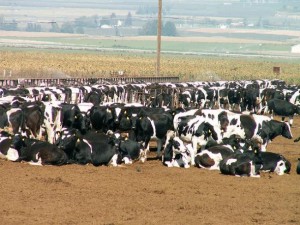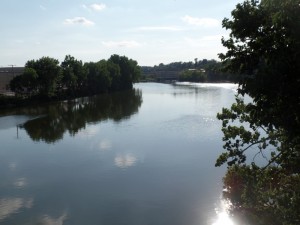Learning the Land: Why it Matters
As we’ve seen in this blog series, learning about the geology of an area can reveal fascinating secrets and intricate associations between ancient processes and modern civilization. Not only that, it allows us to gain a deeper understanding of the world around us, and how billions of years of geologic change have shaped the planet we see today. Enhancing our knowledge in this subject can benefit us in so many ways.
Practical reasons for enriching one’s understanding of the world around them are aplenty, and carry incredible importance. Besides a select few lucky astronauts, every human must share the same planet, and for the near future at least, it’s the only one we’ve got. To know more about it allows us to treat it with respect, and utilize its resources appropriately. As is so often the case, however, this outcome is seldom realized.

A Wisconsin CAFO. Source: Wisconsin Public Radio. http://www.wpr.org/cafo-didnt-violate-manure-spreading-rules-dnr-says
A recent case highlighting the importance of geologic knowledge in our neck of the woods came earlier this year. In May, Wisconsin Attorney General Brad Schimel released an opinion saying that, “the Department of Natural Resources can’t consider the collective impacts of high capacity wells in a given region when issuing new well withdrawal permits,” as summarized by Danielle Kaeding in an article on Wisconsin Public Radio’s website. Concentrated Animal Feeding Operations, or CAFOs, use massive amounts of water, and are being increasingly permitted throughout Wisconsin. Not only that, the manure produced by CAFOs often causes groundwater contamination. While there are certainly reasons for such an opinion being issued, they lack any sort of scientific basis.
Marcia Bjornerud, Professor of Geology at Lawrence University and who was featured in an extended interview in an earlier post, says, “There’s this magical thinking that nature will infinitely provide,” which is simply not the case. Removing water from the water table in one spot without consideration for another ignores the fact that the groundwater notices the collective effect of all wells. Moreover, a lack of understanding of the bedrock leaves water pollution a real issue. Bjornerud explains that while the rock itself has low permeability, vertical fractures in two directions cause a high bulk permeability, resulting in superhighways for groundwater. Because of this, many wells in Kewaunee and Brown Counties are contaminated with bacteria.
Practicality aside, so much can be garnered from broadening one’s geologic horizons. Bjornerud summarizes that sentiment well, saying, “A scientific or geologic understanding of places, for me anyway, really deepens my appreciation of these things, and reminds us of how little we know. And is a reason to be good stewards, and all, of that. Because it’s a legacy, it’s in our hands, and we’ve only begun to fathom what’s there.”

The Fox River in Appleton, a river with a complex geologic history, and our driving force in the Fox Cities
While it can be difficult to grasp sometimes, all of humanity is only a blip in geologic time. The earth has been around for 4.5 billion years, humans for a couple hundred thousand. Indeed, these realities can make a person feel very small. Yet, we are still a part of this world, and have the abilities to cause great changes within it. While the planet may only perceive us existing for a mere moment, we see that period as covering countless lifetimes. There is so much fascination around us, so why not take a moment to learn.










Leave a Comment